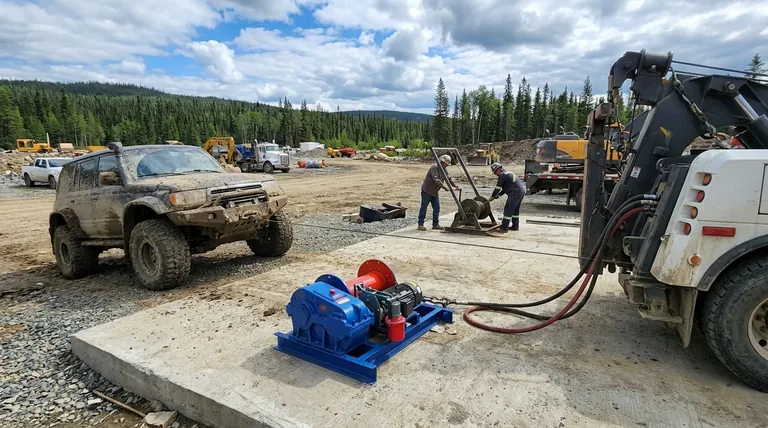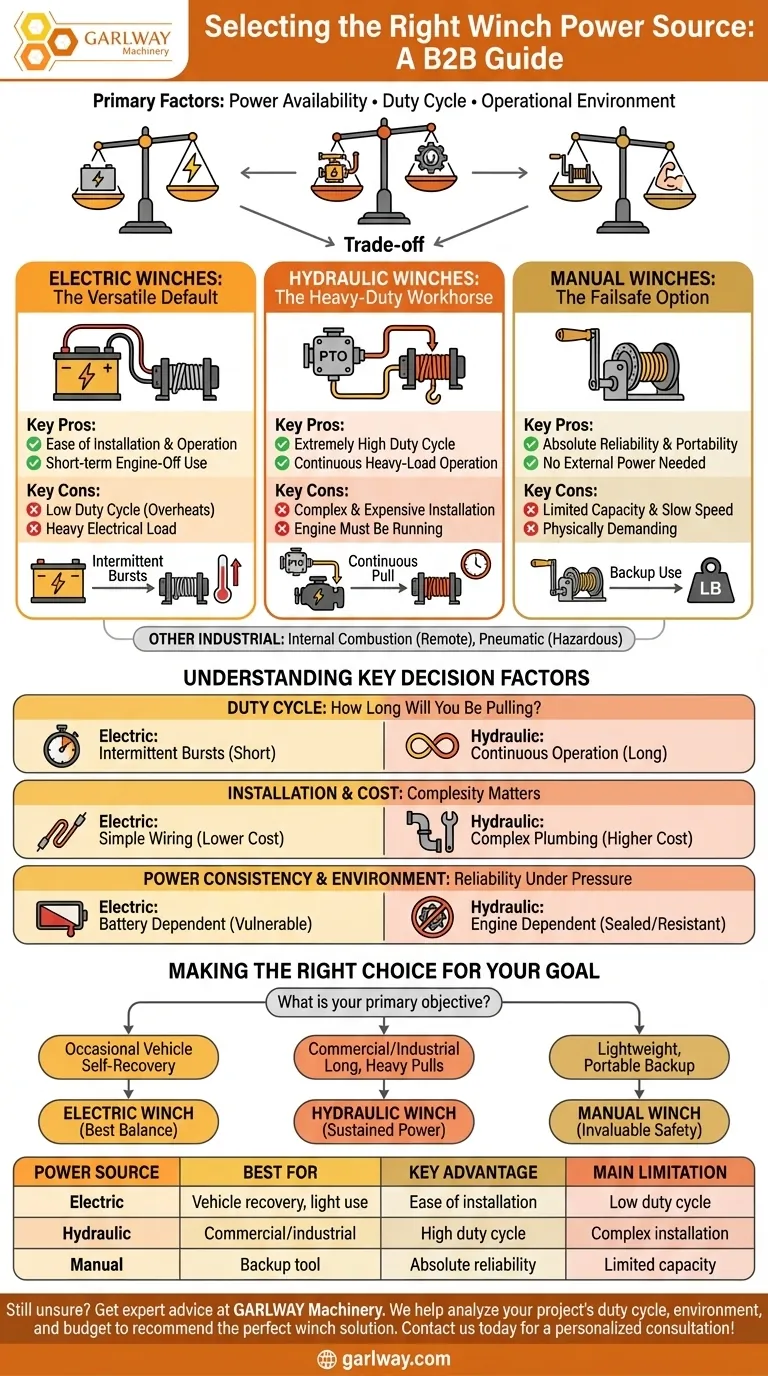The primary factors to consider when selecting a winch power source are power availability, the required duty cycle, and the specific operational environment. Your choice will fundamentally be a trade-off between the convenience of electric power, the sustained strength of hydraulics, and the simple reliability of manual operation.
The ideal winch power source is not the most powerful one, but the one whose characteristics best match the demands of your specific task. Misunderstanding the trade-offs between duty cycle, installation complexity, and power consistency is the most common point of failure.

The Core Power Sources: A Head-to-Head Comparison
To make an informed decision, you must understand the inherent strengths and weaknesses of each major winch type.
Electric Winches: The Versatile Default
Electric winches are the most common choice for consumer and light commercial applications, such as vehicle self-recovery. They run off a DC power source, typically the vehicle's battery, or an AC source for stationary industrial use.
Their primary advantage is ease of installation and operation. They can also function for short periods without the vehicle's engine running, which can be a critical advantage in some recovery situations.
However, their major limitation is a low duty cycle. They generate significant heat and can only run in short bursts before needing to cool down. They also place a heavy load on the vehicle's electrical system, requiring a healthy battery and alternator.
Hydraulic Winches: The Heavy-Duty Workhorse
Hydraulic winches are powered by a hydraulic pump, which is typically driven by the vehicle's engine via a Power Take-Off (PTO) unit on the transmission.
Their key strength is an extremely high duty cycle. Because they are cooled by circulating hydraulic fluid, they can run almost continuously under heavy load without overheating, making them ideal for commercial and industrial use.
The trade-off is complexity and dependence on the engine. Installation is more involved and expensive, requiring hydraulic lines, a pump, and a reservoir. Crucially, the vehicle's engine must be running for the winch to operate.
Manual Winches: The Failsafe Option
Manual winches operate via hand-cranking or a lever mechanism. They require no external power source.
Their value lies in their absolute reliability and portability. With no engine or electrical components to fail, they are a popular choice as a backup tool or for applications where weight and simplicity are paramount.
Their obvious downsides are limited pulling capacity and extremely slow line speed. They are also physically demanding to operate, making them impractical for frequent or heavy use.
Other Industrial Power Sources
For specialized applications, you may encounter other types. Internal combustion winches, powered by their own small diesel or gas engine, are used in remote industrial settings without a host vehicle. Air (pneumatic) winches are used where electric sparks pose a fire or explosion hazard.
Understanding the Trade-offs: Key Decision Factors
Choosing a power source is an exercise in balancing competing priorities. Focus on these three areas to clarify your decision.
Duty Cycle: How Long Will You Be Pulling?
This is the single most important factor. Duty cycle refers to how long a winch can operate over a given period.
An electric winch is for intermittent use—think pulling a vehicle out of the mud in a few short, powerful bursts. Attempting long, continuous pulls will lead to overheating and potential motor failure.
A hydraulic winch is built for continuous operation. Think of a tow truck or a commercial application where the winch might be running for many minutes at a time under constant strain.
Installation Complexity and Cost
An electric winch requires relatively straightforward heavy-gauge wiring to the battery. Many users can perform this installation themselves.
A hydraulic system is a more significant undertaking. It requires tapping into the vehicle's transmission (PTO), mounting a pump, and running high-pressure hydraulic lines. This typically requires professional installation and carries a higher upfront cost.
Power Consistency and Environment
A hydraulic winch delivers consistent, reliable power as long as the engine is running. The sealed nature of the system also makes it highly resistant to water, mud, and dust.
An electric winch's performance is directly tied to the health of the electrical system. Its pulling power can fade as the battery drains. Its electrical components, like the motor and solenoids, are also more vulnerable to damage from water and corrosion.
Making the Right Choice for Your Goal
Filter your decision through the lens of your primary objective.
- If your primary focus is occasional vehicle self-recovery: An electric winch offers the best balance of power, cost, and ease of installation for recreational or emergency use.
- If your primary focus is commercial or industrial use with long, heavy pulls: A hydraulic winch is the only choice for sustained, reliable power and durability.
- If your primary focus is a lightweight, portable, and utterly reliable backup: A manual winch provides an invaluable, power-independent safety net.
By aligning the power source's inherent strengths with your specific operational demands, you ensure your winch is a reliable tool, not a point of failure.
Summary Table:
| Power Source | Best For | Key Advantage | Main Limitation |
|---|---|---|---|
| Electric | Vehicle self-recovery, light commercial use | Ease of installation and operation | Low duty cycle, requires a healthy electrical system |
| Hydraulic | Commercial/industrial use, long heavy pulls | High duty cycle, continuous operation | Complex installation, requires engine running |
| Manual | Backup tool, lightweight applications | Absolute reliability, no power source needed | Limited capacity, slow operation, physically demanding |
Still unsure which winch power source is right for your specific needs?
At GARLWAY, we specialize in providing robust construction machinery, including a wide range of winches, concrete mixers, and batching plants tailored for construction companies and contractors globally. Our experts can help you analyze your project's duty cycle, environment, and budget to recommend the perfect winch solution, ensuring maximum efficiency and reliability on your job site.
Contact our GARLWAY team today for a personalized consultation and get the reliable power you need!
Visual Guide

Related Products
- Electric and Hydraulic Winch for Heavy Duty Applications
- Electric 120V Boat Winch by Badlands
- 12000 lb Heavy Duty Electric Boat Winch
- Electric Hoist Winch Boat Anchor Windlass for Marine Applications
- Heavy Duty Electric Boat Winch Windlass Anchor
People Also Ask
- What additional products are available for winch systems? Boost Safety, Efficiency & Durability
- How much can a 2000 lb winch pull? A Real-World Guide to Safe Vehicle Recovery
- What are the main advantages of using electric winches for vehicle recovery? Gain Safety and Self-Sufficiency
- What are some construction and maintenance applications for winches? Essential Uses for Every Job Site
- Why might someone choose not to install a winch on their trailer? Avoid Costly Loading Mistakes
- What are the benefits of having a winch? Achieve Self-Recovery & Versatile Utility
- How should electric winches be maintained? Ensure Peak Performance and Reliability
- Why do electric winches require lower maintenance? Uncover the Simplicity Advantage



















